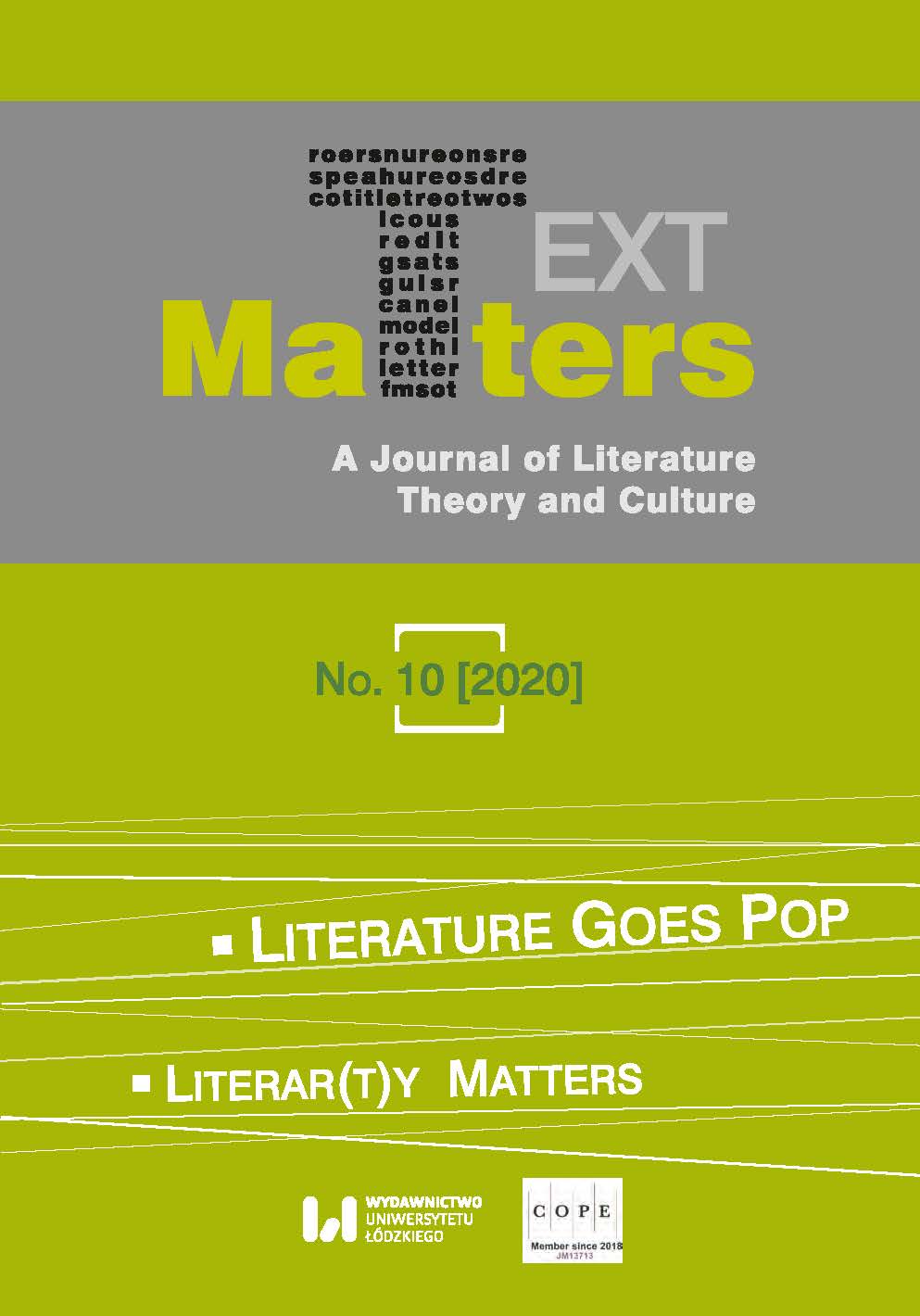Systemic Intertextuality. A Morphogenetic Perspective
DOI:
https://doi.org/10.18778/2083-2931.10.24Keywords:
intertextuality, system theory, structuration, morphogenesis, social capital, cultural capitalAbstract
If late modern literary production is structured by any principles rendering order to the otherwise nebular character of the process, this is the idea of intertextuality that paves the way for the dissolution of well entrenched structures, literary conventions and institutionalized canons. By fostering and facilitating the erosion of boundaries between elite and popular culture, mechanisms of intertextuality show that literature is not only a fixed collection of texts, but also a dynamic social system including structured practices of production and reception together with their institutional, cultural and technological determinants. The paper aims to provide a sociologically-oriented model of intertextual relations taking place within the social system of literature. In this context, circulation, dissemination, and recycling of literary motifs is viewed from a perspective of morphogenetic processes which result in the structural elaboration and systemic change due to the mobilization of social, cultural, and economic capitals in an effort to alter pre-existent practices of signification. Consequently, literature is discussed as an intertextual system in statu nascendi, a sphere of social practices that knows no sense of institutional boundaries or structural constraints.
Downloads
References
Allen, Graham. Intertextuality. London: Routledge, 2006. Print.
Google Scholar
Archer, Margaret S. Realist Social Theory: the Morphogenetic Approach. Cambridge: Cambridge UP, 1995. Print. https://doi.org/10.1017/CBO9780511557675
Google Scholar
DOI: https://doi.org/10.1017/CBO9780511557675
Bakhtin, Mikhail. Problems of Dostoyevsky’s Poetics. Ed. and trans. Caryl Emerson. Minneapolis: U of Michigan P, 1984. Print.
Google Scholar
DOI: https://doi.org/10.5749/j.ctt22727z1
Bakhtin, Mikhail, and Pavel Medvedev. The Formal Method in Literary Scholarship: A Critical Introduction to Sociological Poetics. Trans. Albert J. Wehrle. Baltimore: Johns Hopkins UP, 1978. Print.
Google Scholar
Bakhtin, Mikhail, and Valentin Voloshinov. Marxism and the Philosophy of Language. Trans. Ladislav Matejka and I. R. Titunik. Cambridge, MA: Harvard UP, 1986. Print.
Google Scholar
Barthes, Roland. “Theory of the Text.” Untying the Text: A Post-Structuralist Reader. Ed. Robert Young. London: Routledge, 1981. 31–47. Print.
Google Scholar
Bauman, Zygmunt. Liquid Times. Living in an Age of Uncertainty. Cambridge: Polity, 2007. Print.
Google Scholar
Beck, Ulrich. The Metamorphosis of the World. Cambridge: Polity, 2016. Print.
Google Scholar
Beer, David. Popular Culture and New Media. The Politics of Circulation. New York: Palgrave Macmillan, 2013. Print. https://doi.org/10.1057/9781137270061
Google Scholar
DOI: https://doi.org/10.1057/9781137270061
Bourdieu, Pierre. “The Forms of Capital.” Handbook of Theory and Research for the Sociology of Education. Ed. John G. Richardson. Westport, CT: Greenwood, 1986. 241–58. Print.
Google Scholar
Burzyński, Tomasz. Between the Stage and the Text. Agency and Structure in the Analysis of Cultural Change from the Perspectives of Trust and Uncertainty. Katowice: Wydawnictwo UŚ, 2014. Print.
Google Scholar
Burzyński, Tomasz. “The Surplus of Structure. Towards the Morphogenetic Approach to Cultural Studies.” The Surplus of Culture. Sense, Common- Sense, Non-Sense. Ed. Ewa Borkowska and Tomasz Burzyński. Newcastle upon Tyne: Cambridge Scholars, 2011. 223–34. Print.
Google Scholar
Castells, Manuel. “Materials for an Explanatory Theory of the Network Society.” British Journal of Sociology 51.1 (2000): 5–24. Print. https:// doi.org/10.1080/000713100358408
Google Scholar
DOI: https://doi.org/10.1080/000713100358408
Castells, Manuel. The Rise of Network Society. Oxford: Blackwell, 2004. Print.
Google Scholar
DOI: https://doi.org/10.4337/9781845421663
Derrida, Jacques. “Living On/Border Lines.” Deconstruction and Criticism. Ed. Harold Bloom et al. London: Routledge & Kagan Paul, 1979. 75–176. Print.
Google Scholar
Eco, Umberto. Semiotics and the Philosophy of Language. Bloomington: Indiana UP, 1984. Print. https://doi.org/10.1007/978-1-349-17338-9
Google Scholar
DOI: https://doi.org/10.1007/978-1-349-17338-9
Giddens, Anthony. Central Problems in Social Theory. Action, Structure and Contradiction in Social Analysis. Berkeley: U of California P, 1979. Print.
Google Scholar
Giddens, Anthony. The Constitution of Society. Outline of the Theory of Structuration. Cambridge: Polity, 1984. Print.
Google Scholar
Habermas, Jürgen. The Structural Transformation of the Public Sphere. An Inquiry into a Category of Bourgeoise Society. Trans. Thomas Burger and Frederick Lawrence. Boston: MIT, 1991. Print.
Google Scholar
Kalaga, Wojciech. “Culture and Signification.” Britishness and Cultural Studies. Continuity and Change in Narrating the Nation. Ed. Krzysztof Knauer and Simon Murray. Katowice: Wydawnictwo Śląsk, 2000. 51–69. Print.
Google Scholar
Lee, Benjamin, and Edward LiPuma. “Cultures of Circulation: The Imaginations of Modernity.” Public Culture 14.1 (2002): 191–213. https://doi.org/10.1215/08992363-14-1-191
Google Scholar
DOI: https://doi.org/10.1215/08992363-14-1-191
Putnam, Robert D. Bowling Alone: The Collapse and Revival of American Community. New York: Simon and Schuster, 2000. Print.
Google Scholar
DOI: https://doi.org/10.1145/358916.361990
Sztompka, Piotr. Society in Action. The Theory of Social Becoming. Cambridge: Polity, 1991. Print.
Google Scholar
Sztompka, Piotr. Trust. A Sociological Theory. Cambridge: Cambridge UP, 1999. Print.
Google Scholar
Downloads
Published
How to Cite
Issue
Section
License

This work is licensed under a Creative Commons Attribution-NonCommercial-NoDerivatives 4.0 International License.













